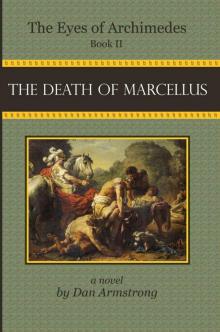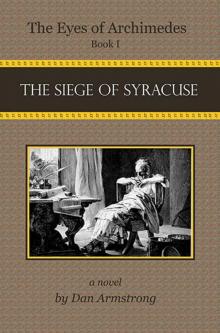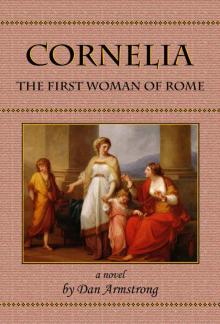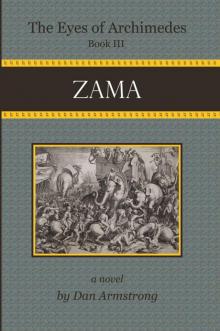- Home
- Dan Armstrong
The Death of Marcellus Page 7
The Death of Marcellus Read online
Page 7
CHAPTER 8
I got a good view of the west side of Rome on the day of the ovation, but with the festivities and the boisterous crowd, it was not a good day to explore the rest of the city. Marcus and I didn’t stay. We went back to the farm where the focus was on preparing for the winter. That afternoon, Marcellus, a man I always associated with the military and war, shed his toga for a worn tunic and went to work in the orchards. Marcus did the same and I joined them.
A week or so after the ovation, Marcus arranged a break in the farm work so that he and I could go into Rome. Marcus wanted to show me where his future bride, Sempronia, lived, and I hoped to create a map of the city so that I could search for my mother in an orderly way.
Marcus and I rode into Rome in the morning. We entered the city from Mars Field through Porta Carmentalis, then headed south through the cattle market. In addition to the villa at the farm, Marcellus owned a residence in the city on the north side of the Aventine Hill. This second home was our first destination.
As we passed the Circus Maximus, the huge sports arena, I noticed a life-size statue of a powerful-looking man with a lion skin in his left hand and a club in his right.
“Is that Heracles?” I asked Marcus, recognizing the Greek hero from the pose.
“We call him Hercules, Timon. The son of Jupiter is as important to Romans as he is to Greeks. He killed the three-headed monster Cacus on the top of the Palatine Hill as his tenth labor.”
“Are you saying he brought the cattle of Geryon from the Pillars of Hercules through the Alps to Rome?”
“That’s the story we tell. Some say Hannibal sought to emulate Hercules by following the same route. Hercules is known as Melqart to the Carthaginians and is revered by them as well.”
“Meaning Hannibal intends to intrude upon the mythology as well as the walls of Rome?”
“So it seems.”
When we reached the Claudian residence, we were greeted by two slaves, a male and a female. They lived in quarters behind the house and kept the place ready for any time Marcellus or Portia might want to spend a few days in the city or host a social gathering. Ithius, a man well past sixty, managed the stable and the grounds. Laelia, in her thirties, served as the cook and house maid, much as Meda did at the villa on the farm.
Both Ithius and Laelia had known Marcus since childhood and had not seen him since his return from Sicily. After a brief, enthusiastic reunion, Ithius, who was Greek, stabled our horses behind the house, allowing Marcus and me to set off on a walking tour of the city.
The home of Marcus’ bride-to-be was north of Circus Maximus in one of the wealthy neighborhoods on the east side of the Palatine Hill. To get there we had to weave our way through the labyrinth of narrow streets and filth that was the Subura, a district of lower-class housing.
Before the house was in sight, Marcus suddenly stopped, clearly very anxious. “Timon, this is as far as I go.” He pointed to a turn in the road. “That’s the street. Sempronia’s house is the third one on the right. Just walk by. Identify it for yourself. Maybe glance around. And then come back. I’ll wait for you here. Another day, when you are alone, you can come back and spend more time.”
“Is there anything that distinguishes the house? To verify that I have the right one?”
“That’s all I was told. The third house on the right.”
I went up the street to the third house on the right. Like all the Roman homes, it had no ground level windows. Any view into the living space required going around to the back to look in through the garden. Excited and feeling like a snoop, I made a quick circuit of the house but saw no one. I noticed that the terracotta image of Janus—the two-faced God of Doors that hung over nearly every door in Rome—was painted blue. The others that I saw were either plain terracotta or white.
I walked around the house a second time, again seeing nothing of significance, then returned to where Marcus was waiting.
“Did you see her?” he asked immediately.
“No, but I found the house. It had a blue Janus over the front door.”
We spent the rest of the day wandering through the city. As I had seen from the top of the Capitoline Hill, many of the temples, religious shrines, and larger homes were situated on the hills. The greater part of the populace lived on the bottom land between, and those residences came in many shapes and sizes, mostly small and poorly built. The upper-class neighborhoods had streets wide enough for two carts to pass, well-kept flower gardens, and a few small trees. The streets in the lower-class neighborhoods, like the Subura, were no more than alleys with tenements squeezed in as close as space allowed. Some were three or four stories high and looked as though a stiff wind could blow them over.
Marcus led me down an alley that was only as wide as my arms’ span and stank of human waste. Dogs and goats and chickens dodged around and through our legs. Refuse flew at random from the upper story windows. At one point, Marcus had to take two quick side steps to dodge a melon rind filled with egg shells.
I had seen some of this in Syracuse, but much of Rome, it seemed, dwelled in garbage. I was not impressed. The entire time we walked I looked for my mother’s face in the passersby. It became something I would do every time I came to the city, knowing the odds were long on finding her.
Marcus and I climbed to the top of all seven hills. We paced off the longest distance possible on the top of each hill, then took sightings from each endpoint to a specific temple or column across the city. I carried my wax pad and wrote down all the numbers. When I had some time at the farm, I would lay everything out on a piece of papyrus, and using a compass and a straight edge, draw the most accurate map of Rome I could. Mapmaking wasn’t something I had done before, but with all that Archimedes had taught me about geometry and triangles, it was well within my capacity.
Late in the afternoon we walked through the Roman Forum, the center of all social and political activity in Rome. The Temple of Concord at the base of the Capitoline Hill marked the extreme west end of the five hundred foot by two hundred foot paved plaza. The round Temple of Vesta, where six virgin priestesses maintained Rome’s sacred flame, sat at the east end. In between were the tomb of Romulus—really no more than a large black stone—and a deep pool named the Lake of Curtius, in memory of a young soldier who as a human sacrifice had thrown himself in full armor into the water to drown. Strings of shops, always busy with customers, formed the north and south perimeters of the piazza.
Marcus took me to the Senate House, called the Curia, located north of the Temple of Concord. The front stairs to the Senate led down into a large sunken amphitheater, which Marcus referred to as the comitium. “See the speaker’s platform overlooking the comitium,” he said, pointing. “It’s known as the rostra because it’s built from six bronze ramming beaks, called rostra, taken from ships sunk in the battle of Antium.”
A man in a toga stood at the rostra speaking to a modest gathering as we passed. We stopped to hear what he was saying.
“How much longer will we allow Hannibal to run wild in Italy?” the man shouted. “We might be safe here within the walls of Rome, but how long can that last if Hannibal’s army continues to live off food that’s meant for you and me? You’ve heard the reports. Sicily’s grain harvest is still in jeopardy. The granary in Murgantia is under Carthaginian control. It’s time to focus all our military assets on one target—Hannibal. It’s time to drop Fabius’ delaying tactics and drive the Carthaginians out of Italy for good.”
Even though the Fabian strategy, after six difficult years, had recently begun to show signs of success, many in Rome remained firmly against Fabius’ tactics. Holding back simply wasn’t Roman. Many men in the crowd yelled this out, encouraging the speaker.
I watched Marcus watching the crowd. Although his father had long been an opponent of the Fabian strategy, he continued to toe the line. Marcellus had his disagreements with Fabius. He had called him out in the Senate several times, but as we had learned after the military review
at the Temple of Bellona, Marcellus had decided to work with Fabius rather than fight him.
Marcus turned to me. “That speaker is one of my father’s clients. There are ten such men who work under Publius. They speak in the forum every day and pressure senators. Every political faction in Rome has its battery of clients.”
The speaker continued as if he had heard Marcus’ words. “I know of only one general who has held his own against Hannibal. Twice he repelled the Carthaginians from Nola. Last winter this same man captured Syracuse. You know who I’m taking about.” The man turned to point to the Temple of Jupiter on the hill to the west. “We all saw him on the Capitoline Hill last week.”
Someone in the back of the crowd shouted, “Marcellus!”
Others followed, chanting, “Marcellus, Marcellus.”
“That’s right. When it comes time for the centuries to assemble, when it comes time to elect our next pair of consuls, be sure to vote for Marcellus. Only he can rid Italy of the Punic menace.”
The crowd erupted in a nearly unanimous cheer of support. Marcus looked at me and grinned. This was exactly the kind of lobbying his father needed.
A man on the far side of the comitium called out in a loud voice. “Why not simply make him dictator?”
The man at the altar answered with equal volume. “The position of consul is all he seeks.”
The man in the crowd shouted back, “Why not make him king?” I recognized him from the military review.
Marcus turned to face me and shook his head. “Cato.”
Others in the crowd shouted Cato down. “We have no kings in Rome,” they screamed. Jeering and individual shouting matches broke out in various parts of the comitium. Others in the forum were drawn in by the heated exchanges.
Cato strode out of the crowd, up onto the rostra. With a ruddy complexion and large intense eyes, Cato was none too handsome. He had a thick, square physique to go with his strong opinions and powerful desire to express them. Although a plebeian farmer, he had made his name in the forum, arguing law for a fee, and gaining a reputation as a clever and persuasive speaker who rarely lost a case.
Cato boldly pushed aside the man who had been speaking, then addressed the crowd with a passion and clarity that were hard to ignore. “I fear your wonderful Marcellus may want Hannibal too much,” he shouted. “The man is full of ambition. Don’t miss that! His eyes are on a crown.”
Marcus edged up close to me. “By the gods, this man angers me. It’s not my father who’s ambitious, but him.”
“You can be sure,” continued Cato, “Marcellus orchestrated his troops’ procession from Ostia to Mars Field with a purpose. He may have accepted an ovation, but that caravan of effeminate Greek art got him the attention he wanted.”
Marcus shook his head. “Hold me back, Timon, so I don’t pluck him from the stage.”
“And wasn’t that quite a show he performed at the altar of Jupiter,” bellowed Cato to a crowd that murmured and buzzed after every comment he made. “Marcellus has no feelings for the gods. His skepticism is well known among the pontiffs. To see him there, declaring the slaughtered lamb’s entrails perfect, knowing all the while there was irreverence behind his every action, made me sick. The man is nothing but vanity. Don’t be so quick to rush him off after Hannibal. He might return a god.”
Cato wrapped his toga around himself with a flourish and stalked away from the rostra. Marcus went after him, catching him from behind, and pulling him around by the shoulder. “How can you claim to know so much about my father’s ambitions? He has no interest in being dictator, much less king. You’re just making that up!”
Cato’s red face darkened to purple. He swatted Marcus’ hand off his shoulder. The two men faced off as if to fight. The crowd closed in around them, forming a ring.
Cato was a capable soldier, but Marcus was a good head taller and owned a reputation in battle like that of his father’s. You could see it in the smaller man’s fiery gray eyes, measuring his chances. “We all know that speaker was some hooligan your father hired to stir up the forum,” sneered Cato. “Someone had to shut him up.”
“Watch your mouth,” threatened Marcus, stepping up close to Cato, daring the man to strike him. “You cast stones at one of Rome’s finest generals. That could be called treason in times like these when victories are so precious. If my father has ambition, it’s for defeating Hannibal. He doesn’t seek power or royalty, but glory, the kind of glory any good Roman would seek.”
Cato scowled, boiling for a fight, but quickly turned away and disappeared into the crowd.
Marcus watched him leave, his eyes on fire. “Let’s go before I do something I’ll regret.”
As we walked away, pushing our way through the throng, I saw Fabius at the edge of the crowd. I pointed him out to Marcus.
“No surprise there, Timon. Young Cato is a protégé of Fabius and was probably acting on instructions from the old man.”
“But I thought your father had decided to work with Fabius. Why were your father’s clients attacking Fabius’ strategy? And why would Fabius prompt a man like Cato?”
“Nothing is as it seems, Timon. That’s Roman politics today. Too much theater and not enough substance. I have no idea what deals my father has arranged, but I have no stomach for anything that includes Cato.”
CHAPTER 9
In the weeks after the ovation, Marcellus concentrated on work at the farm and made trips into Rome only when he had meetings with Publius or his clients. He never drank in excess, spoke infrequently, and when he did, it was on matters strictly related to care of the farm. Like most Romans, Marcellus thrived on hard work in the winter and war during the spring and summer.
Marcus’ life was similarly regimented. He had specific tasks every day and was often in the fields from dawn to dusk, sometimes working with the slaves, sometimes working with his father. His only recreation, if you could call it that, was military exercises. These might take place at Mars Field with an entire cohort or at home where he would refine his skills. Fellow officers would come to the farm to spend the afternoon dueling with their gladii, throwing spears, or running in full armor to build their stamina.
Military training was the heartbeat of Roman life. Every citizen was responsible for his own weapons and armor, and was expected to be ready for the call to duty at any time. While classroom education focused on rhetoric, male children began training for the military almost from the moment they could walk, starting with a strict discipline in physical fitness and endurance. Wrestling, boxing, and swimming were taught early in life, progressing to fighting with a sword, throwing a javelin, and protecting oneself with a buckler. They would begin with wicker shields and wooden swords, thrusting and slashing at a wooden post to gain accuracy and strength, before moving on to dueling one-on-one. Marching and marching at speed were also central elements of early training. By the age of seventeen a young Roman was fully prepared to join the army.
In those first few weeks I lived at the farm, I regularly joined the father and son in the fields. I didn’t really know what my duties were other than tutoring Marcus, which usually took place after the evening meal, but I was treated like one of the family and felt that I should pitch in.
I worked with both Marcus and Marcellus one afternoon in late autumn. We swept through the last unharvested field of wheat using long scythes with sharp bronze blades. Marcus and Marcellus moved like machines. I had never done this kind of work before and wasn’t quite sure if I was helping or getting in the way.
The day was crisp and cool, but the sun was out and the work was demanding. Marcellus had removed his tunic and was stripped down to little more than a loincloth and sandals. His broad shoulders glistened with sweat as he swung the scythe from side to side, reaping huge swaths of grain and tossing them to the side.
Marcellus was tall for a Roman, still less than six feet, wide across the chest and hindquarters, thick in the neck, like a bull, yet graceful. Looking like a god with his beard grow
n full and curly, Marcellus could outwork anyone on the farm.
We had been in the field since daybreak. Our work was nearly done. Unsheaved stacks of wheat lay all around us. A few last stalks stood like fringe around the edge of the field. It had been a long hard day for me, trying to keep up with the father and son.
Marcellus stood alone in the center of the field. I wanted to ask him for permission to go into Rome on my own. I conversed freely and often with Marcus, but only spoke when spoken to in the presence of Marcellus or Portia.
Marcellus always maintained a stone-like seriousness, which could be intimidating. I stood before him and addressed him as I would my own father. “Sir, I’m uncertain of the freedoms I have while living at your home. I would like to go into Rome sometime this week, and I seek your permission.”
Although many might not believe it, Marcellus was more than a block of stone. Brown as an almond, and slick with sweat, he smiled at me with genuine pleasure. “Timon, you are a free man. You may do whatever you like.” He nodded his head, accenting his words. “Come spring you will be traveling with the Roman army and living under the disciplines of a soldier. But here, your only duty is to tutor Marcus. Otherwise, my home is yours and your time is free. Balius is available for you to ride. Go to Rome whenever you want.”
“Thank you, sir. I just wasn’t certain.”
Marcellus laughed in a way that he rarely did. “Even this work in the field is voluntary, Timon. Your Greek education is more than enough contribution to our household.” He looked at me with the warmth of a parent. “What interests you in Rome?”

 The Death of Marcellus
The Death of Marcellus The Siege of Syracuse
The Siege of Syracuse Cornelia- the First Woman of Rome
Cornelia- the First Woman of Rome Zama
Zama